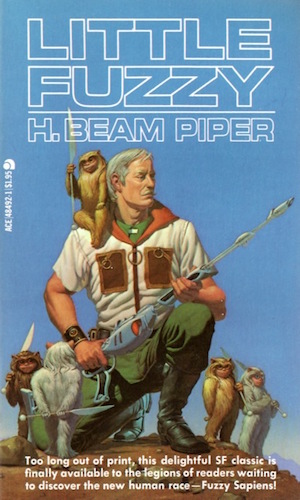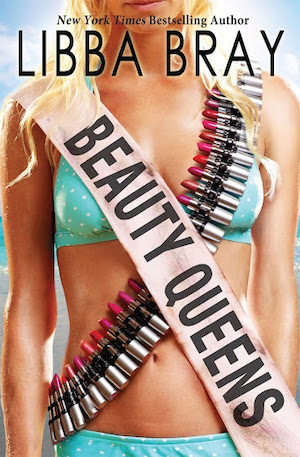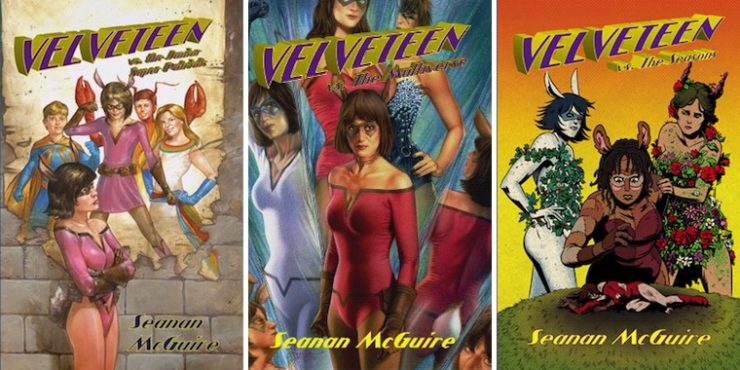If we’re to believe much of modern media, wealthy folks are admirable, hardworking, and ethical people. Job creators! It follows that large corporations must, by virtue of the vast wealth under their control, be exemplary guardians of the public good. Their every action, from abruptly abandoning long-standing open licenses to inflating the price of necessities, must serve some higher purpose, even if that purpose remains unclear. The alternative is to believe we live in some sort of horrific dystopia. That’s simply unacceptable.
Writers being the beings that they are, they will immediately wonder if they can concoct amusing stories by standing received wisdom on its head. This can result in some memorable stories, such as the five that follow.
Chartered Zarathustra Company (Little Fuzzy, by H. Beam Piper)

Under the benevolent laws of the Federation, Class III worlds—worlds with no indigenous population—are sold to chartered companies, whose control of planetary economies compensates them for the expense of developing the worlds. Some decades after just such a corporation has bought the planet Zarathustra, prospector Jack Holloway makes a momentous discovery: Zarathustra has natives, adorable little Fuzzies! This means Zarathustra isn’t a Class III planet but a Class IV world.
Company head Victor Grego understands the implication: if Zarathustra is a Class IV world, the Chartered Zarathustra Company’s charter is so much waste paper. The Company faces a grim prospect: losing a small fraction of its vast wealth. Solution? Simply exterminate the Fuzzies before the Federation can reclassify Zarathustra.
Fans of adorable, photogenic aliens will be relieved to discover the proposed genocide never gets off the ground. There is a single tragic murder, which leads to a very important court case. Some readers may be interested to know that having proposed wiping out the Fuzzies and having done his best to keep the Fuzzies from being recognized as intelligent, Grego somehow manages to be a heroic figure in the Fuzzy sequel, Fuzzy Sapiens, just by not being as terrible as the designated antagonists.
United Energy and Transport (Rissa Kerguelen series, by F. M. Busby)

No sooner did UET win control of the North American government than they set about subjugating the population. Legions were shuffled into the notorious Total Welfare Centers, slave camps by another name. Having murdered naïve visiting aliens, UET used stolen technology to extend their rule to the nearer stars.
UET’s grand vision had a few blind spots. Their heavy-handed management motivates its subjects to rebel whenever they have the opportunity. Because UET were limited to near-light speed travel, they found it hard to control their star colonies. They would have liked to be iron-fisted tyrants…and couldn’t be. Corporate management on Earth was congratulating itself while UET’s empire was disintegrating.
UET had hoped to motivate their employees (slaves) with a lottery. The lottery boasted a lavish prize, which UET took steps to ensure that nobody ever collected. It was hoped that the slaves would see themselves as temporarily embarrassed oligarchs. They didn’t. Nor did UET manage to prevent bold lottery winners (like Rissa) from collecting their wins.
GrayCris Corporation (The Murderbot Diaries, by Martha Wells)

The GrayCris corporation hopes to make a huge profit from finding and exploiting alien relics (some of which are potentially dangerous). There are regulations forbidding just this sort of behavior, regulations which GrayCris has ignored. The payoff was potentially very large and the risks were negligible, provided nobody took a close look at the backwater world GrayCris was exploiting.
When Dr. Mensah’s team made discoveries that might embarrass the corporation, GrayCris decided to solve the problem by killing off Dr. Mensah’s team. Unfortunately for the company bottom line, Murderbot, the surly SecUnit assigned to Dr. Mensah, has managed to hack its own system. It’s now autonomous; it can do what it feels is right rather than what’s profitable for GrayCris. Adventure ensues.
The Corporation (Beauty Queens, by Libba Bray)

The Corporation runs the Miss Dream Teen beauty contest, which selects the White teen woman best able to conform to unreasonable beauty standards (there are two contestants who are women of colour, one of whom will be the runner-up and thus serve as proof of inclusivity).
All is going to plan until the plane containing all the contestants crashes on page three of the novel.
Thirteen of the fifty contestants survive. At first glance, their circumstances seem dire. They are trapped on a seemingly deserted island with little hope of rescue. Matters are worse than they know; the island contains secrets that the Corporation is eager to conceal. Secrets the Corporation will kill to conceal.
Readers eager for something upbeat may be relieved to discover that Beauty Queens, far from being a re-do of Lord of the Flies, is a comedic novel. Inept corporate scheming is faced with feminist consciousness raising and contestants whose skills prove easily repurposed for survival.
I am a little sad that this novel has not, to my knowledge, been greenlighted for a film version. It would fit the current zeitgeist as reflected in films like The Menu and Glass Onion.
Super Patriots (Velveteen Vs. series, by Seanan McGuire)

Super Patriots is the umbrella corporation for which almost all of the United States superhero teams are franchises. One unified management ensures that the disparate American superhumans are on the same page when it comes to policy vital to the public good. No policy is more vital to the public good than Super Patriots’ bottom line.
Velma “Velveteen” Martinez discovered to her considerable distress that while what was good for Super Patriots might be good for America, it certainly wasn’t good for Velveteen. Rather than submit to the cruel whims of the marketing division, Velveteen embraces independence. This is an affront marketing will never forgive. Velveteen begins her career already provided with an archenemy.
Velveteen is a fine example of how seemingly minor superpowers may not be minor at all. The powers that be downrated her because they couldn’t see any potential in being able to animate and control toys and other inanimate objects. The main requirement seems to be that the object have a face of some kind. Would the Smiley Face on Mars be sufficient? Does Super Patriots really want to find out?
***
Five books are only a few of the many works that treat of the evils of giant corporations. You may have your own favourite examples not mentioned above. If so, comments are, as ever, below. (No real-life examples, please. Not every evil corporation is litigious but of some it might be said that They Sue Regularly.)
In the words of fanfiction author Musty181, four-time Hugo finalist, prolific book reviewer, and perennial Darwin Award nominee James Davis Nicoll “looks like a default mii with glasses.” His work has appeared in Interzone, Publishers Weekly and Romantic Times as well as on his own websites, James Nicoll Reviews (where he is assisted by editor Karen Lofstrom and web person Adrienne L. Travis) and the 2021 and 2022 Aurora Award finalist Young People Read Old SFF (where he is assisted by web person Adrienne L. Travis). His Patreon can be found here.










